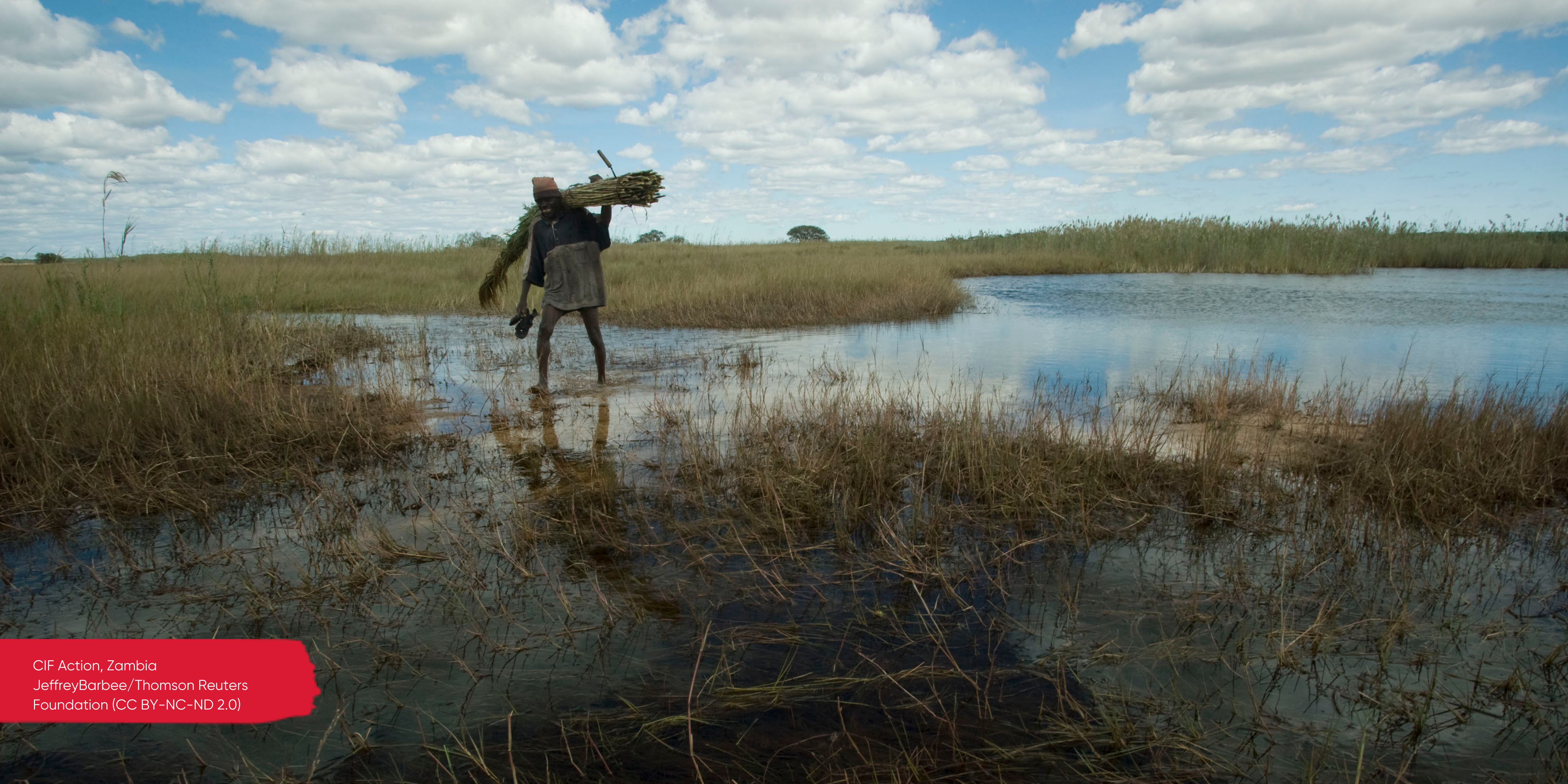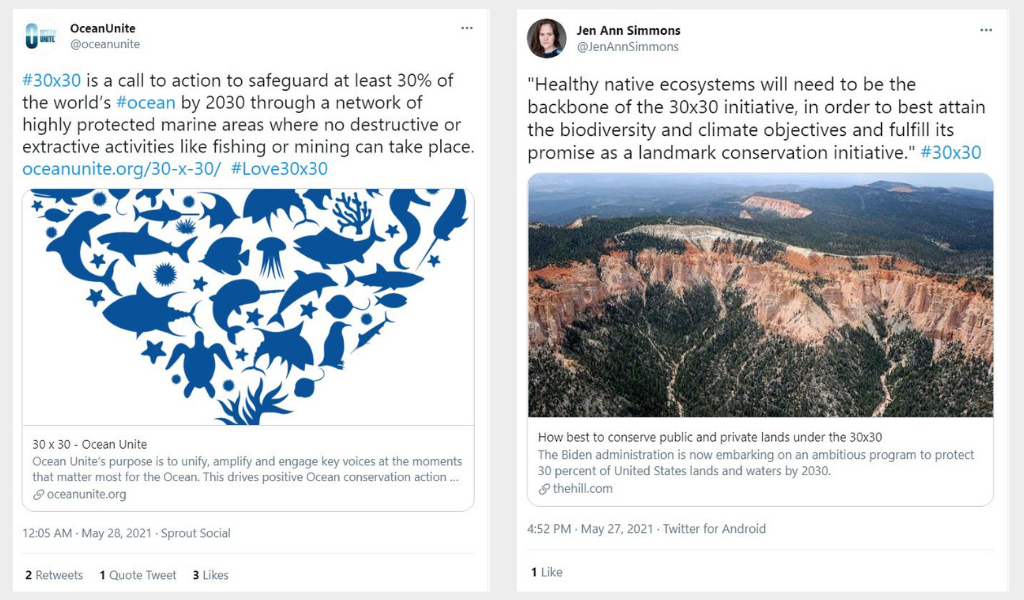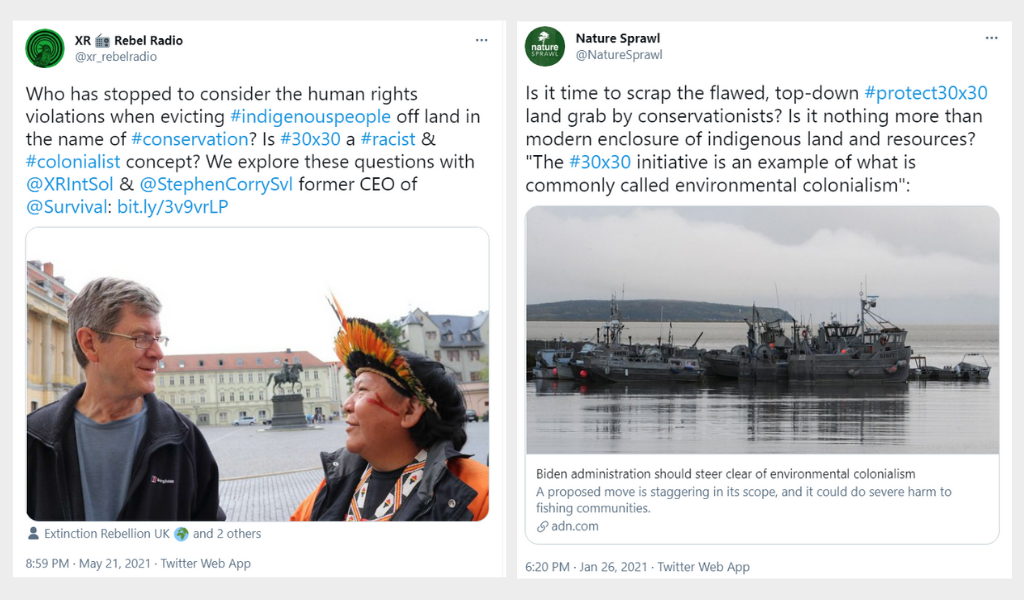Every member of the G7 has signed up to a global initiative to protect or conserve at a minimum 30 per cent of the world’s land and ocean territory by the year 2030, as well as a commitment to having a ‘30×30’ plan in their respective countries.
30×30 has received wide spread support from conservation groups such as the Wyss Foundation, the Nature Conservancy and publications including National Geographic. The initiative is designed to ‘bend the curve of biodiversity loss by 2030’ and combat the climate crisis. Social media analysis reveals that despite strong push-back from critics there is a widespread trend of support for the 30×30. However, according to researchers and campaign groups such as Amber Huff and Survival International the initiative is far more likely to further deprive indigenous and marginalised peoples of their land while protecting the interests of countries in the Global North.

With 58 percent of the world’s population active on social media, we consider analysis of social conversations as an increasingly valuable way of identifying how people engage, understand and influence policy makers. This is particularly useful for understanding global debates on biodiversity, conservation, and the climate crisis, including perceptions of the 30×30 initiative. We turned to social monitoring platform, Meltwater, to complete analysis of the past 12 months of global Twitter conversations leading up to the G7s ratification of the 30×30 initiative in May 2021. Our analysis focussed on use and engagement with content including keywords relating to 30×30, biodiversity and conservation.
What does the data reveal?
The analysis showed that the idea of protecting 30 percent of the planet has driven considerable interest with 13,200 mentions on Twitter over 12 months that in turn were reshared more than 20,000 times. Through sentiment analysis, we can see that the majority of online activity has been in favour of 30×30, espousing its perceived benefits as a way to protect biodiversity and combat climate change. Much of the online conversation in the build up to the G7 summit was aimed directly at policy makers as a way of influencing them to ratify the initiative. This push towards 30×30 was reinforced by other online campaigns such as a petition started by the Campaign for Nature which went onto be shared over 1,000 times on Twitter by people who wished to put pressure on the G7 to bring the 30×30 initiative into force.
 Examples of some of the 13,000 tweets that have used the ‘#30x#30’ hashtag.
Examples of some of the 13,000 tweets that have used the ‘#30x#30’ hashtag.
Challenging the majority view
However, while there is broad support across social media users for 30×30, there is a counter narrative that argues it could cause damage. This is based on concern from researchers and activists as to international conservation industry’s impact on indigenous people, among other problematic aspects of 30×30. Researchers such as Amber Huff argue that “the international conservation industry has a long history of failing to recognise or act on the problems it can cause, particularly in the area of ‘green grabbing’. Our global biodiversity and climate crisis requires action, but the action must address the root drivers of crises and accept the fact that people can and do live sustainably with nature, while making use of it for their livelihoods and wellbeing.”
While 30×30 is positioned as a global project that will benefit everyone around the world, the blanket plan has the potential to remove indigenous, first nation and rural farmers, foragers and fishing communities from their livelihoods and lands in the name of environmental ‘restoration’. This is because most of the 30 percent of ecosystems that is targeted to be protected belongs to or is the traditional home of these communities. In these areas, communities are already disproportionately impacted by the effects of climate change and the loss of biodiversity. The 30×30 initiative will increase their vulnerability due to insecure land rights while deepening the inequalities felt by the economically marginalised.

In our analysis of social conversations related to 30×30, it is clear that the researchers, practitioners, conservation professionals and activists who voice criticism of the initiative create debate in the media. However, in social media conversations they are completely overshadowed by those voices supporting 30×30. For example, one of the most wide reaching tweets of the past year came from Leonardo DiCaprio who linked to an article in National Geographic (itself widely shared) which discussed a recent study strongly supporting 30×30 as a way to protect ocean for biodiversity.
Building a counter narrative
In the build up to the G7, we saw the emergence of a significant social media campaign trying to dispel the conventional wisdom of 30×30 and offering alternative solutions aimed at addressing the root causes of biodiversity loss and the climate crisis. The Survival International hashtag ‘#BigGreenLie’ was used over 1,600 times in the past 12 months, with this content going onto be retweeted over 8,600 times. The social campaign around #BigGreenLie aimed to dispel incorrect information while raising awareness of the challenges faced by marginalised communities. Other popular hashtags that were used included ‘#FightEcofascism’, ‘#WWFfundsAbuse’, and ‘#DecoloniseConservation’.
This Animated video condenses the complexities of the counter narrative arguing that environmental restoration should not come at the cost of community livelihoods in the Global South.
Whose voice is missing?
Climate change, biodiversity loss and the threat to ecosystems are complex issues that are unlikely to be solved by one step solutions. What is missing from the global conversation, particularly amongst policy makers, are the voices of those living in marginalised communities on the land that is being argued over. Analysis of the top social media posts by reach (number of unique people who have seen the content) show that none of the top 100 posts on 30×30 or climate change more generally came from an account run by an indigenous, first nation persons, group or tribe. While of course many in such groups may not be online, this shows how debates on social media can be skewed and unrepresentative.
In fact, of the top 100 posts by reach that used the opposing hashtags #30×30 or #TheBigGreenLie, only three came from accounts of persons or groups outside of the Global North. Looking deeper at the data we can see that of the combined 46,200 uses of these hashtags, only 899 were from accounts registered in Global South nations. Of these, accounts registered in Kenya, Brazil and Mexico were at the top, all nations where ecosystems and indigenous peoples are under threat.
#TellCOP26 about #ClimateJustice
What the above analysis shows is that most of the global debate about conservation and biodiversity misses the nuances within the 30×30 initiative. While there are some outliers, the loudest voices within online spaces typically do not engage with the structural causes of bio-diversity loss and the climate crisis instead often arguing for one step solutions. The effect of this online public debate goes onto impact policy makers, as we have seen with the recent G7 ratification of 30×30.
The debate on how best to address the climate and biodiversity crisis is far from over. Later this year, the UK hosts the 2021 United Nations Climate Change Conference (COP26). Ahead of this event IDS has been attempting to raise the issue of climate justice up the global policy agenda. We encourage you to help us with this, posting about what climate justice means to you and why it matters using #TellCOP26 and #ClimateJustice.
Amplifying the voices of those excluded
Throughout this analysis we have seen the absence of voices and perspectives on biodiversity, the climate crisis and 30×30 from indigenous, first nation and rural farmers, forager and fishing communities. Below is a list of some individuals and organisations whose voices we feel deserve some much-needed amplification.
âpihtawikosisân – A writer focusing on First Nations, Métis and Inuit issues in Canada.
CBC Indigenous – News and current affairs coverage from Indigenous communities across North America.
Alethea Arnaquq-Baril – An Inuk documentary filmmaker.
Ryan McMahon – Producer of the Red Man Laughing podcast, an Indigenous arts & culture podcast.
Lynda-June Coe – One of the many young, powerful Aboriginal women activists demanding justice and rights for Aboriginal peoples.
Nessa Turnbull-Roberts – Bundjalung writer and activist fighting against the injustices that disproportionately affect Indigenous peoples.
Indigenous Peoples Movement – A collective of various indigenous peoples from all over the world, from all nations, uniting in the stand against issues that directly affect their lands, peoples, and respective cultures.
AFrontlines – Who work in partnership with indigenous communities defending rights to land, life and cultural survival in the Amazon rainforest.
Indigenous Peoples Rights International – An organisation that works to protect Indigenous peoples rights, and unite and amplify the call for justice to victims of criminalisation and impunity.